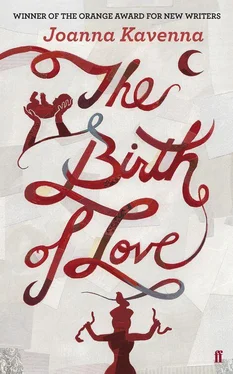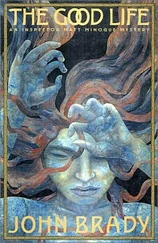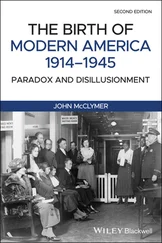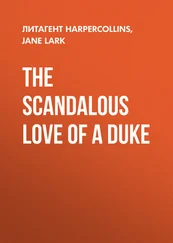And how did this happen?
As I mentioned before, our guides had left us with some sacks of seeds. At first we did not understand. Then we realised what we must do. The process was arduous and full of errors. A storm washed half our crops away. The birds took some of our seed. But gradually our vegetables grew.
That was a wonderful thing, to see how the earth could grow food. How it nourished us in the end, once we understood its workings a little better. In the season before the army came …
Correction, Protection Agents.
… we had grown enough food to be comfortable. We knew then that we would be able to stay there for the natural course of our lives. We knew these lives would be shorter than the span we might have expected in Darwin C. We would have no cell therapy, no gene readjustment. Our bodies would age naturally and sicken and die. But we were content with this. If I die tomorrow, then I am content. I would trade decades of life in Darwin C for a year of this life among the rocks. I think, though I cannot speak with any certainty, that the others would have agreed. Before Birgitta’s mother died she said as much.
Correct ‘mother’ for the record. How did this egg donor die?
She had been ill in Darwin C. She had been on cell therapy and so in deciding to go with Birgitta she had effectively sacrificed her life. We did not know this until the last days of her life. Finally she told us, and she said that she was so glad she had come. She wept, with Birgitta holding her and kissing her and crying onto her face. She died slowly and in pain. In Darwin C she would of course have had every medicine available and the Corporeal Scientists would have judiciously shortened her life at the point at which they deemed her no longer functional or worthy of resource use. We were more profligate and we fed her to the last and kept a fire burning in her house. By then it was winter and though the climate shift meant that this winter was not cold at all,
Birgitta’s poor dying mother …
Correction, egg donor.
… was convinced that she had returned to the winter fastness of her childhood and kept saying, ‘Keep the fires burning, don’t let the fires go out.’ Everyone who sat with her sweated and grew parched, but she believed the snows were driving against the windows, that the sea was frozen solid and that the roof was being rattled by icy blasts. She told us stories of trolls and berserks, the old mythical characters of her …
Prisoner 730004, do not insult the Protectors with these nonsensical digressions.
I am sorry. There is so much I remember. I remember Birgitta’s mother saying goodbye to her daughter, knowing that they would never meet again, and I felt such a sense of the depths of love passing between them and the beauty and sadness of this bond between parent and child, and how we have betrayed ourselves.
It is tedious to have to remind you again, on behalf of the Protectors, that such digressions are inappropriate. Correct ‘mother’, ‘daughter’, ‘parent’ and ‘child’ as usual for the record. How many of you deserted Darwin C?
I am afraid I cannot tell you.
You cannot or you will not?
I cannot because of the promise I made.
We are obliged to remind you for your own protection how very important it is that you co-operate with us.
I understand. But I am afraid I cannot tell you.
We hope you will see reason before it is too late. When did Birgitta’s egg donor die?
She died in the winter after we arrived. She never saw the birth of her grandchild.
Correction, progeny of the species. And, Prisoner, do not digress into these absurd fantasies.
I am sorry but I do not regard them as …
How many of your camp died?
Several in the early months. From starvation. We all denied ourselves food in order to feed Birgitta. We all went without. So some of us could not survive. The sacrifice was necessary.
Please do not call your species-threatening actions a sacrifice. That is a very grave offence and trivialises the efforts of all those working for species survival. Will you explain who the guides were?
I am afraid I do not know.
How can you not know?
We never knew their identities. We never saw their faces. I do not know where they came from and where they have gone.
Yet they supplied you with seed and guns?
Yes, they did.
How did they procure these things?
I do not know.
You did not ask?
No, I did not.
But did you not think it strange, that in a civilisation in which access to all resources is necessarily restricted, for the protection of the species, these guides of yours had acquired guns? And bullets? And seeds?
Everything was strange. It all seemed like a dream. The crate, sweaty and vile. The passageway or tunnel and my confusion about whether it was day or night. The incessant beating of the waves and the vision of a landscape I had never seen before but somehow recognised, and all the suspense of our crossing and the shock of our arrival. And so when our guides, who we knew only as our guides, unloaded the boxes I barely noticed what they contained and definitely didn’t consider the meaning of the objects. I was transfixed by the mountains and the vastness of the sky. I didn’t ask any questions.
Did anyone in your camp know anything about the guides?
I don’t think so.
But someone made contact with them?
Yes, perhaps someone did.
Is there anything else you can share with the Protectors about the identity of these guides?
I am afraid not. I know nothing else about them.
What did you do in this camp?
After the initial months when we were merely trying to survive, we settled into a rhythm, a very ancient rhythm I believe, of rising with the sun and going to sleep with the dusk, of passing the days collecting food and tending our crops and the evenings singing songs and telling stories. And in general we were preparing for the birth.
How were you preparing for this imaginary event?
We were trying to make Birgitta as strong as we could, so her body would withstand the trials of childbirth. Only one among us knew the true nature of these trials — Birgitta’s mother.
Correction, egg donor.
But she told us the body was grievously tested and Birgitta must be as strong and nourished as possible. So in the evenings we brought Birgitta presents — things we had found or made for her, extra foodstuffs, treats, and in turn she would show us the great roundness of her belly, the skin taut across the mound, the navel stretched and almost inverted, and we would take it in turns to place our hands upon it, and to feel the movements within. The sudden thrust of a foot. The probing exploration of a hand. Sometimes, a great ripple of the flesh as the miraculous cargo turned. Of course once these things had been commonplace but now they were to us a matter for great awe.
And you thought she was the ‘Magna Mater’, as you called it?
No, we didn’t think Birgitta was the Magna Mater. We were not sure of anything. But we observed something — some creative power — within her. And this force, or presence, whatever it was — made Birgitta stronger and more serene by the day. She was no longer cowardly and reluctant. She no longer found her body revolting. In Darwin C she had only wanted to rid herself of the signs of her improbable state, but on the island, among rocks and trees and water, she somehow understood the force that was within her. Among these natural forms, in the natural flow of life, perhaps she came to accept what was happening to her. It was something like that. Birgitta is not the Magna Mater. The Magna Mater — or whatever life force is suggested by this term — is something that I believe exists within her and within all humans. But it is just a phrase somebody heard, or remembered. Its deeper meaning is lost to us at this time. We have our instincts but we have been encouraged to suppress them and it is hard for us to name such ancient forces.
Читать дальше












